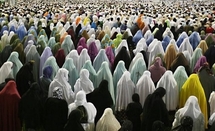Saudi religious cop denies firing for liberal views on women
AFP
RIYADH- A senior member of the Saudi religious police repeated on Wednesday his support for Muslim men and women mixing, and denied that his stance against strict separation rules had got him fired.
Sheikh Ahmed al-Ghamdi, the cleric who heads the Mecca branch of the Commission for the Promotion of Virtue and Prevention of Vice, told Al-Arabiya television a widely circulated news report that he had been sacked by the head of the organisation over his views was not true.

Muslim women pray outside Mecca's Grand Mosque in 2009. (Mahmud Hams/AFP)
He also said he believed there is no strong evidence that Islam outlaws mixing between unrelated men and women, as long as women are veiled, Al-Arabiya reported.
Rumours that Ghamdi would be dismissed from the commission, variously known as the muttawa and the religious police, have circulated ever since he said in a December interview that he supported allowing men and women to mix.
Saudi Arabia's strict Wahhabi school of Islam forbids unrelated men and women from being together. One of the key duties of the religious police force is to prevent mixing, with arrest and possible jail sentences the punishment.
The rule is under pressure from Saudi progressives and many women, who say it is used to maintain various restrictions on women, including a complete ban on women driving cars and controls on their going out in public.
Another area where Ghamdi broke ranks with his organisation was over the forced closing of all businesses for prayer five times a day.
Some businesses could be allowed to stay open, for instance during noon prayer, Ghamdi has said.
Ghamdi repeated his beliefs in a newspaper interview last week, leading to the newest rumours.
But his endorsement in December of a new research university near Jeddah, where men and women scientists freely mix in their work, has placed him on the side of Saudi King Abdullah, for whom the new institution is named.
The king, whose pictures receiving women official visitors are usually published in the media, is believed to be in favour of relaxing the mixing rules, though he has never publicly stated so.
------------------------------------------------------------------------